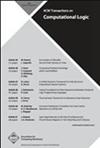流微积分中的乘积、多项式和微分方程
IF 0.9
4区 数学
Q3 COMPUTER SCIENCE, THEORY & METHODS
引用次数: 0
摘要
我们从代数和协代数的角度研究了在一个域\(\mathbb {K} \)上多项式、微分方程和流之间的联系。我们首先介绍流上的(F, G)-积类,其中积的流导数可以表示为流及其导数的多项式函数。我们的第一个结果是,对于每一个(F, G)-乘积,存在一个规范的方法来构造多项式上的转移函数,使得从多项式到流的唯一最终协代数态是(唯一的)交换\(\mathbb {K} \) -代数同态,反之亦然。这意味着可以通过流的多项式表示进行代数推理。我们应用这一结果得到了多项式流等价的代数-几何决策算法,适用于底层的泛型(F, G)积。最后,我们扩展该算法来解决一个更一般的问题:找到适合用户指定的多项式模板的所有有效多项式等式。本文章由计算机程序翻译,如有差异,请以英文原文为准。
Products, polynomials and differential equations in the stream calculus
We study connections among polynomials, differential equations and streams over a field \(\mathbb {K} \) , in terms of algebra and coalgebra. We first introduce the class of ( F , G )- products on streams, those where the stream derivative of a product can be expressed as a polynomial function of the streams and their derivatives. Our first result is that, for every ( F , G )-product, there is a canonical way to construct a transition function on polynomials such that the resulting unique final coalgebra morphism from polynomials into streams is the (unique) commutative \(\mathbb {K} \) -algebra homomorphism – and vice versa. This implies that one can algebraically reason on streams via their polynomial representation. We apply this result to obtain an algebraic-geometric decision algorithm for polynomial stream equivalence, for an underlying generic ( F , G )-product. Finally, we extend this algorithm to solve a more general problem: finding all valid polynomial equalities that fit in a user specified polynomial template.
求助全文
通过发布文献求助,成功后即可免费获取论文全文。
去求助
来源期刊

ACM Transactions on Computational Logic
工程技术-计算机:理论方法
CiteScore
2.30
自引率
0.00%
发文量
37
审稿时长
>12 weeks
期刊介绍:
TOCL welcomes submissions related to all aspects of logic as it pertains to topics in computer science. This area has a great tradition in computer science. Several researchers who earned the ACM Turing award have also contributed to this field, namely Edgar Codd (relational database systems), Stephen Cook (complexity of logical theories), Edsger W. Dijkstra, Robert W. Floyd, Tony Hoare, Amir Pnueli, Dana Scott, Edmond M. Clarke, Allen E. Emerson, and Joseph Sifakis (program logics, program derivation and verification, programming languages semantics), Robin Milner (interactive theorem proving, concurrency calculi, and functional programming), and John McCarthy (functional programming and logics in AI).
Logic continues to play an important role in computer science and has permeated several of its areas, including artificial intelligence, computational complexity, database systems, and programming languages.
The Editorial Board of this journal seeks and hopes to attract high-quality submissions in all the above-mentioned areas of computational logic so that TOCL becomes the standard reference in the field.
Both theoretical and applied papers are sought. Submissions showing novel use of logic in computer science are especially welcome.
 求助内容:
求助内容: 应助结果提醒方式:
应助结果提醒方式:


